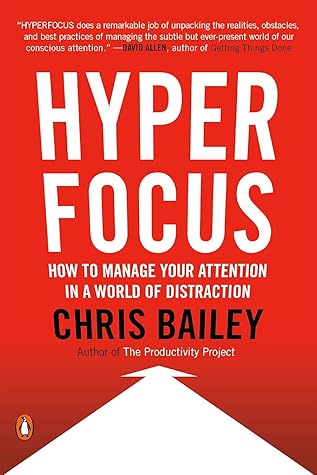More on this book
Community
Kindle Notes & Highlights
by
Chris Bailey
Read between
September 22 - October 8, 2018
Spending time on unnecessary work tasks keeps us busy, but such busyness is just an active form of laziness when it doesn’t lead to actually accomplishing anything.
An unfortunate truth is that the brain is not built to do knowledge work—it’s wired for survival and reproduction.
productivity means accomplishing what we intend to.
Productivity is not about cramming more into our days but about doing the right thing in each moment.
Setting specific intentions can double or triple your odds of success.
The greater your working memory capacity, the more information you can hold at the same time and the greater your ability to process complex tasks.
An elevated mood actually expands the size of your attentional space,
Our energy levels influence how well we’re able to focus.
Awareness is really just a process of noticing things,
* The power of meditation is that reining your mind to focus on a small and simple object of attention makes focusing on more complex things easier. As a result, your mind wanders less often, you’re able to focus more deeply and for longer periods, and the quality of your attention increases dramatically. Meditation practices are less intimidating than you may think and are worth trying.
The larger your attentional space, the more your mind wanders when you work on something simple. This is further evidence that the smartest members of your team should be assigned the most challenging work.
There is a strong relationship between working memory capacity and intelligence—


